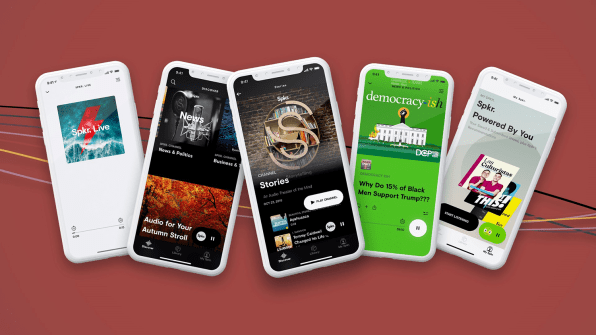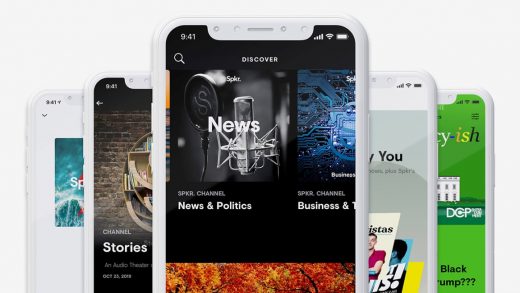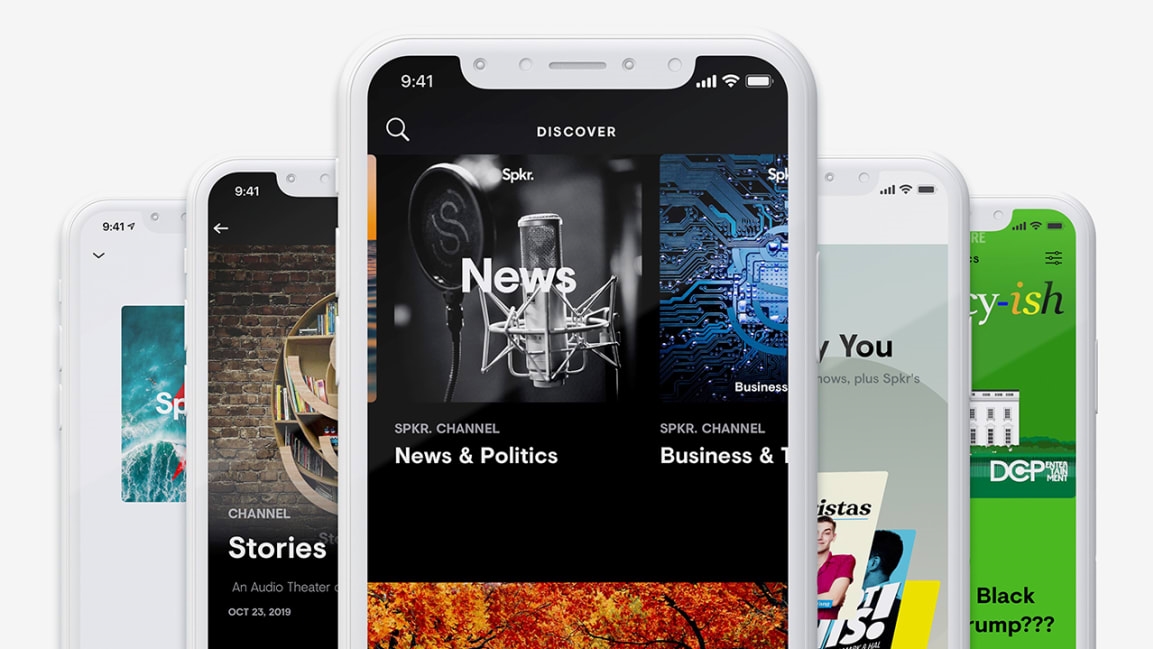The guy who suggested podcasts to Steve Jobs thinks he can find your next favorite
Almost since the dawn of podcasting as a medium, creators have been asking, “Why isn’t anyone listening to my podcast?” They beg listeners to rate them five stars in the Apple Podcasts app with the hope that it improves their status in the recommendation algorithm, and they try to guest on shows by their more popular friends believing that it’ll expose them to a new and wider audience.
Many believe it’s because podcasts have a discoverability problem, arguing that in a crowded market, when anyone with an iPhone can record an episode and put it online, it is difficult for people to surface high-quality content that suits their taste.
Launching on Apple iOS today, Spkr, which bills itself as the “first audio platform centered on short-form content,” is the latest app trying to solve that problem.
Veteran TV and radio executive Andy Schuon, who previously launched alternative rock station KROQ-FM and developed Revolt TV with Sean Combs, used his years of programming experience to build the app. His interest in podcasts began over a decade ago—by his own account, he gave former Apple CEO Steve Jobs the idea for them in the early 2000s. “I got a call one day out of the blue from Steve Jobs who was still at Apple,” he says. “He was doing a lot of thinking around his suite of products like iTunes and GarageBand, and he wanted me to come out to Cupertino for a brainstorm session. This was when the iPod was just out. When we sat down, I was subjected to the normal kind of a meeting that Steve Jobs would give most people—a lot of abuse. At the end of our meeting, he asked me what my big idea was, and I said, ‘iPod shows. Nobody knows you can do something else besides play music with MP3s.’ He sat back, and he looked at me and said that was a very small idea,” Schuon says.
Podcasts are not as popular as music or TV, but they’re growing in importance—to Apple, its rival Spotify, and many others in the entertainment business.
After the meeting, Schuon continued working in TV and radio as podcasts started to grow. “I thought there was an opportunity. Something didn’t feel right about the way people were being presented this content,” he says, adding, “I kept hearing all of these places saying they’d solved the [podcast] discovery [process], and I would go to them and I’m like, no, you haven’t. This is basically a library or a store. This has recommendations in links.”
He was also unhappy that podcast discovery often happened visually. Users had to look through lists or view recommendations. “It’s a place that’s very silent,” he says, “where I’d have to search for things with my eyes instead of my ears.”

The Netflix UI of audio
At Spkr, an in-house team curates short clips from podcasts and uses AI to play a selection of shows they think the user will like, a bit like how Netflix plays clips from movies or TV shows that its algorithm thinks users will enjoy. Opening Spkr without being prepared is a somewhat disconcerting experience: Clips start playing automatically.
This is because Schuon wanted to create a frictionless experience. “[It’s] like when you turn your car on and the radio just comes on,” he says.
The app analyzes which clips listeners like and which ones they decide to skip—using a swiping movement familiar to dating app users—to build a list of personalized recommendations. “We thought it was important that we didn’t try to personalize [recommendations] by asking a bunch of onboarding questions. The most important thing we could do is present [listeners] with a lot of choices, and then because it’s a smart system based on the way you interact with Spkr, it becomes more tuned to you,” Schuon says.
The hard challenge of podcast recommendations
“What ends up happening is it’ll play a bunch of stuff, and you’re not necessarily likely to enjoy what you’re hearing,” he continues. “How many times are you going to start something new and listen for 10, 20, 30 seconds, or even a few minutes, before you realize it’s not what you want? How many, you know, misses, do you go through until you’re just like, this isn’t worth the effort?” Despite Schuon’s desire, Carter fears that “it’s another example of too much friction.”
Clips can give users an initial insight into a show or episode, and Carter believes that they are most useful outside of a podcast app—when they are shared on social media. “When they see it on social media, they are not going to stop what they’re doing in the moment to listen to a full episode, but it might be the thing that finally nudges them to bookmark an episode or subscribe to a show to actually listen to later.”
Spkr lets listeners share clips from the app on social feeds.
Podcast listening is only growing: Spotify recently reported that the company has seen exponential growth in podcast hours streamed in its third quarter. Spkr joins a crowded ecosystem of podcast apps, but if the guy who apparently gave Steve Jobs the idea for the podcast can’t get you the right recommendations, what hope is there for the rest of them?
(15)



